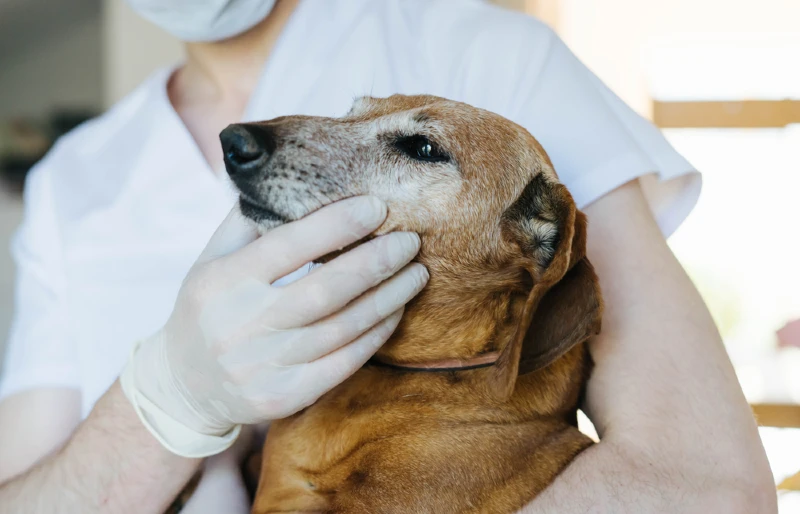My Dog Ate a Cigarette Butt: Our Vet Recommends What to Do
Updated on

Dogs can get themselves into all sorts of trouble, regardless of how closely you keep an eye on them. You’re probably worried about what comes next if you caught yours munching on a cigarette butt on your walk or grabbing one from your home ashtray.
Cigarettes in any form are dangerous for dogs because of their primary ingredient, nicotine. Without prompt treatment, your pup can experience severe side effects and may even die.
Read on to learn more about nicotine, its dangers, and why you must see a vet as soon as possible if you think your pup has eaten a nicotine-containing substance.
Why Is Nicotine Dangerous?
Nicotine is a stimulant and fast-acting toxin that can cause serious side effects for dogs. In extreme cases, exposure to the toxin can cause cardiac arrest and death. Nicotine mimics a chemical (acetylcholine) that is made in the body that is responsible for stimulating nerves. Nicotine at a low dose results in overstimulation of the nerves and at a high dose can cause the nervous system to be overwhelmed. This is why we can see such an array of clinical signs associated with nicotine toxicosis, ranging from a drunken gait, all the way to cardiovascular depression and death.
An average cigarette contains between 15-20 milligrams of nicotine, though varieties that contain as little as 6 milligrams and as much as 28 milligrams are available. When smoked, the nicotine will concentrate in the end that goes into the mouth. This means that the small nub left at the end contains approximately 25% of the nicotine in the original cigarette.
Smoking a cigarette gives up to two milligrams of nicotine to the smoker. However, ingesting it is a whole other story, as all the nicotine present will be available for absorption.
The good news is that ingested nicotine is poorly absorbed from the stomach due to the stomach acid providing a very low pH. However, once it reaches the intestines, it will be absorbed more quickly. Nicotine fortunately tends to stimulate the vomiting sensors in the brain, leading to vomiting that can potentially save your pup’s life. However, even if your pup vomits, it is very important that you still take him straight to the vet.

How Much Nicotine Is Toxic for Dogs?
A minimum lethal dose of nicotine in dogs is reported at 4 mg per pound body weight, but clinical signs have been seen at a dose of 0.4mg per pound body weight. Depending on the size of the dog, this could be anything from half a cigarette, up to multiple cigarettes. A 10-pound dog would only need to be exposed to 5 to 10 mg of nicotine to be poisoned.
What Are the Signs of Nicotine Poisoning?
Some signs of nicotine poisoning can begin as quickly as one hour after ingestion.
- Drooling
- Excitement
- Agitation
- Vomiting
- Diarrhea
- Twitching
- Unsteady gait
- Tremors
- Seizures
- Fast heart rate
- High blood pressure
- Cardiac arrest
- Death
The degree to which the pet is affected depends on the amount of nicotine consumed and the weight of the pet.
What Do I Do If My Dog Ate a Cigarette or a Cigarette Butt?
Nicotine ingestion is an emergency, so you must see the veterinarian as soon as possible if you suspect your dog has eaten a cigarette, cigarettebutt or any other nicotine containing product e.g E-cigarette, chewing tobacco, cigar, patches or gum.
Vomiting often occurs after ingestion. This is good news as it makes the chance of severe nicotine toxicosis less likely. However, your dog must still be taken to the vet to continue treatment and for monitoring.
Vomiting can be induced by the vet if not too much time has passed since consumption. However, this is not something you should try to do at home unless under your veterinarian’s advice. Your vet may also use activated charcoal to bind the nicotine to prevent it from entering the body.
Treatment after this point would then be supportive. Your vet may recommend intravenous fluids to promote circulation while your pup’s body works to rid itself of the nicotine. Anti-seizure medications may be necessary if seizures or tremors are present. Chances are your vet will recommend hospitalization and baseline blood work, even in cases of mild toxicity, to ensure your pup is supported as it breaks down and excretes the remaining toxins.
What Is the Prognosis for Nicotine Poisoning?
The prognosis will depend on several factors; the dose of the exposure, whether it was vomited up, and how quickly after exposure it vomited, and the size of the dog.
Low-dose exposures that are treated promptly typically have an excellent prognosis. Even dogs with high-dose exposures can make a complete recovery if they are seen quickly and successfully stabilized.
Unfortunately, dogs that experience prolonged seizures or cardiac changes may suffer from permanent brain or organ damage.

What Other Ingredients Are in Cigarettes?
Unfortunately, it isn’t just the nicotine in cigarettes you should be worried about. According to Healthline, cigarettes contain a handful of other substances and chemicals, all of which can cause harm to your pup.
- Acetone: found in nail polish remover
- Ammonia: a household cleaner
- Arsenic: an ingredient in rat poison
- Benzene: found in cement and gasoline
- Butane: found in lighter fluid
- Formaldehyde: used as embalming fluid
- Lead: used in batteries
- Methanol: component in rocket fuel
- Tar: used in road paving materials
How Can My Dog Be Exposed to Nicotine?
It’s not just cigarettes that you need to worry about. Many nicotine-containing products on the market could potentially harm your pup.
- Cigars: up to 200 mg of nicotine per cigar
- Chewing tobacco: 6 to 8 mg of nicotine per gram
- Nicotine gum: up to 4 mg of nicotine per piece
- Nicotine patches: up to21 mg of nicotine per patch
- E-cigarette cartridges: up to 40mg of nicotine per cartridge
Final Thoughts
Timing is everything if you believe your pet has eaten any nicotine-containing item. The sooner you get him to the vet, the better his prognosis.
Prevention is easier and cheaper than treatment, so be careful about what substances you’re leaving in your dog’s path. Additionally, keep a close eye whenever walking in public with your pet. You can’t control when or where strangers put out their cigarettes, and you never know when your pup will decide a cigarette butt is on the menu for the day. The quicker you respond, the better.
Featured Image Credit: Semevent, Pixabay














